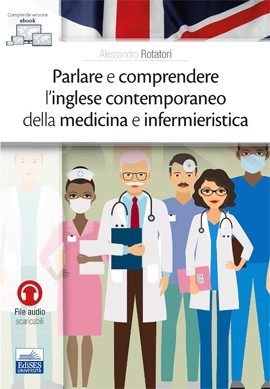“Italian medical professionals are extremely fortunate. At a time when the need to speak and understand English is more pressing than ever, and in a field where poor pronunciation can lead to embarrassment or far worse, they have Alessandro Rotatori as their guide”.
This is how Geoff Lindsey, Director of the Summer Course in English Phonetics and Honorary Lecturer in Linguistics at University College London, UK, begins his personal introduction to Alessandro Rotatori’s new book, Parlare e comprendere l’inglese contemporaneo della medicina e infermieristica, EdiSES Università, 2020:
https://www.edisesuniversita.it/area_sanitaria/rotatori-parlare-e-comprendere-l-inglese-contemporaneo-della-medicina-e-infermieristica.html
The book is aimed at any Italian-speaking member of any of the health care professions looking for an authentic and up-to-date guide to the kinds of expressions that English-speaking doctors and nurses use every day in the practice of their profession.
The author provides guidance not only on pronunciation, but also on grammar and vocabulary, and points out many of the potential traps for Italian speakers. The material is organised around a number of realistic dialogues in clinical settings: admission to hospital, pain, discussion of treatment, patient discharge and the like. Both General British (GB) and General American (GA) varieties of English are used. A thorough survey of the sounds of the two varieties is provided and the audio files, available on the website linked to the book, are a great bonus.
The author has supplied his realistic spoken texts with accompanying versions in modern simple phonetic spellings which are colloquial in style, so that he shows clearly examples of the variations and adjustments to context that he prepares his readers to find that words may undergo in ordinary daily speech. He even includes, for those who may be interested to observe them, simple indications of the kinds of rhythms and intonations that typically accompany the use of the idiomatic speech that he represents.
Alessandro Rotatori makes unprecedentedly extensive use of cross references that repeatedly do not merely inform his readers of the existence of additional information but takes them to it instantly at the click of a computer mouse. Most of these internet accessions are of course to the book’s integral corresponding website but many more are to valuable resources such as videos from the BBC, articles by specialists in the field of English pronunciation, and various items dealt with at the author’s own blog.
For further information about the book, please visit Alessandro Rotatori’s website, https://www.foneticainglese.it/

